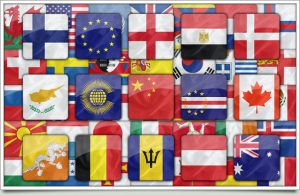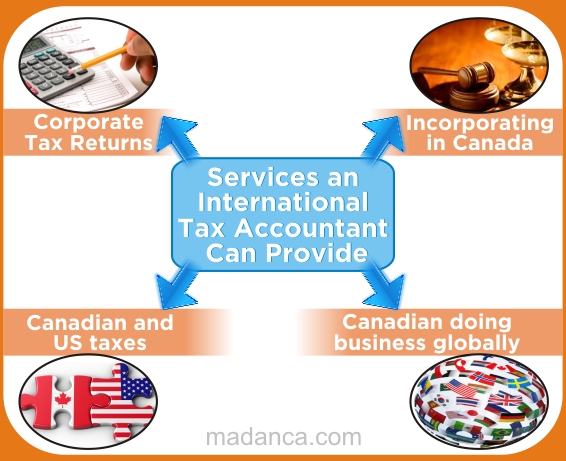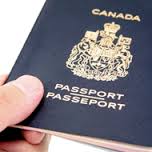International Tax Accountant in Toronto
Allan Madan, CPA, CA
I am an international tax accountant in Toronto. I help my clients with tax compliance, foreign reporting, withholding tax and inbound and outbound tax planning.

Non Residents and Canadian Taxes
Are you a US based corporation that makes sales to Canadians customers? Or are you an individual working in Toronto? Perhaps you are a non resident investor in Canada? If you answered ‘Yes’ to any of these questions, then you should consider me for your tax compliance matters, because of my international tax experience.

As an International Tax Accountant in Toronto, I help my US and non-resident clients with:
– Corporate tax return preparation
– Canadian foreign reporting requirements
– Incorporating in Canada
– Withholding tax and waivers
– Tax exemptions pursuant to the Canada-US tax treaty
– Branch tax
– Permanent Establishment in Canada
– Preparation of Canadian personal tax returns for Americans and other foreigners working in Canada
Below, I have highlighted the most important international tax issues for non-residents of Canada and for Canadians with US ties.
1.) Permanent Establishment
When conducting business in Canada you should fully understand what a permanent establishment is and its implications for your business.
A permanent establishment can be:
a.) Fixed place of business, such as an office, workshop, or factory
b.) A construction or installation project site in Canada, lasting more than 12 months
If your company has a permanent establishment in Canada, then it is required to file a Canadian Corporate Income Tax Return. Your company will be subject to the same corporate tax rate as a Canadian based business. In addition, your company will only be taxed on profits derived from its establishment in Canada and not the profits in its home country.
2.) Treaty Protection with no Permanent Establishment
If you do not have a permanent establishment but are still doing business in Canada, your company is required to file a Canadian tax return. This is commonly referred to as the Canada-US Treaty Tax Return. This form is to inform the CRA that your company is conducting business in Canada and does not have a permanent establishment in Canada. Thus, you are not required to pay corporate taxes.
Allan Madan, International Tax Accountant in Toronto, recommends “Foreign companies doing business in Canada should file a Treaty-Return; Otherwise, the CRA may tax them on their gross sales”
What happens when a US Company sends independent contractors to fulfill a job order request in Canada? From the criteria we discussed above this wouldn’t be considered a permanent establishment as the US Company has no fixed place of business in Canada. The US business would therefore not be liable for Canadian taxes.
Many individuals were taking advantage of this tax loophole until the government introduced the term deemed permanent establishment in 2007. This term states if the following two criteria are met then the company will liable for taxes in the country the deemed permanent establishment is located.
Criteria #1:
– If an individual provides services in another country for more than 183 days in any 365 day period and;
– If more than 50% of the gross revenue of the company was derived from the services provided.
Criteria #2:
– If an individual performs services in another country for at least 183 days in any 12 month period with respect to the same or connected projects.
– Contracts must be wholly or geographically different.
Say a US company – US Inc sends an employee to provide engineering consulting services for Canadian business. The contract is scheduled for 10 months and the fee upon completion is $300,000. US Inc has gross revenue of $1 million during the year from its business operations. Is this company deemed to have a permanent establishment in Canada?
Criteria #1:
US Inc would not meet criteria number one. Although it will be present in Canada for more than 183 days, only 30% (300,000/1,000,000) of its gross revenue was attributed to the sale. Thus we must move on to criteria number 2.
Criteria #2:
Assuming that the company does indeed provide services in Canada for 10 months, then criteria 2 will be met as it has exceeded the 183-day threshold.
Let’s further assume that instead of a 10-month contract US Inc makes two contracts of 5 months each with the same business in Canada to provide the same services (i.e. engineering consulting).
The second part of criteria 2 states that contracts of a similar nature will be counted together towards the 183 days. Since the 2 contracts of 5 months each exceed the threshold of 6 months then US Inc will have met criteria #2 and will be deemed to have a permanent establishment in Canada.
3.) Individuals temporarily working in Canada
In order to be considered a non-resident you must either:
1.) Live outside of Canada throughout the tax year
2.) Stay/work in Canada for less than 183 days
Non-residents are still required to pay taxes for employment income they may earn in Canada. As such, as a non-resident, you are still required to file a non-resident Canadian personal tax return.
A common issue for many non-residents who temporarily work in Canada is receiving their T4 forms. Let’s take a look at a common example that many individuals from the US deal with when working in Canada.
Many temporary workers who are US citizens will not receive T4 slips from their employers. This can result in huge fines and interest on owing tax to the individual. It is important that if you are a non-resident to make sure to request your T4 slip before February 28th from your employer for Canadian income tax purposes.
Let’s assume Mary, an American citizen, works 250 days during the year as follows: 100 days in America and 150 days in Canada. Her income is $100,000. Mary’s tax liability will be for both American and Canadian taxes, prorated for the days she worked in each country. Her tax liability will be determined as follows:
100/250 = 0.4 x $100,000 = $40,000 of US employment income on which US income taxes will be levied American Tax liability
Canadian Tax Liability
150/250 = 0.6 x $100,000 = $60,000 of Canadian employment income on which Canadian income taxes will be levied
Therefore Mary’s employer should also be putting aside some of her income to be withheld for paying her Canadian income taxes on $60,000 of Canadian employment income for the year.
4.) Deemed Resident of Canada
According to the CRA you are considered a deemed resident of Canada if:
a.) You lived outside of Canada and are: 
– A government employee,
– Member of the Canadian Forces, or
– Working under a Canadian International Development Agency (CIDA) assistance program
b.) Sojourned in Canada for 183 days or more, and are not considered a resident of another country.
If you are deemed a resident of Canada your tax obligation is on your world-wide income not just your Canadian income. I would suggest seeing an international tax accountant for matters like this as they can become fairly complicated.
5.) Canadian Residents and Foreign Taxes
As an International Tax Accountant in Toronto, I can prepare US tax returns for my clients and I can also provide:
– Advice to companies on the most tax-efficient way to repatriate profits from the US to Canada
– Assistance with setting up US corporations & partnerships in low tax jurisdictions (e.g. Delaware, Nevada)
– Recommendations on business expansion into the US and other foreign countries
– Advice to Canadian investors on how to buy US real estate
– Tax return preparation for Canadians working in the US
6.) Withholding tax and waivers
Helping clients reduce (or eliminate) withholding tax on payments made to non-residents is a large part of my practice. Withholding tax applies in a variety of situations, the most common of which are:
– Payment of dividends
– Payment of management fees
– Payment of interest
– Cash received on sale of Canadian real estate
– Rents received by non-residents from Canadian rental properties
– Payments received by non-residents for services rendered in Canada
Because of the complexities and timing consuming nature of international taxation, many companies and individuals have chosen to outsource this task to a third-party international tax accountant in Toronto.
Regulation 105 Withholding Tax
American corporations doing business in Canada are certainly subject to withholding taxes. Regulation 105 of the income tax act requires theses businesses to withhold 15% of fees, commissions, and any other amounts paid to non-resident contractors for services rendered in Canada. This withholding tax will be credited towards your potential tax liability while working in Canada. It can be claimed when filing your Canadian income tax return.
This withholding tax can be reduced through the 105 waiver application. The contractor would file this form with the CRA requesting the withholding tax to be reduced. They will have to show sufficient evidence that their potential tax liability is less than 15% while working in Canada. This must be done 30 days prior to commencement of the job or 30 days prior to the initial payment.
NR4: Statement of Amounts Paid or Credited to Non-Residents of Canada
NR4 slips are issued when a Canadian company withheld taxes from payments made to a non-resident contractor. The form is completed by the customer of the contractor and submitted to the CRA for approval.
I would be pleased to discuss how an International Tax Accountant in Toronto can be of assistance with respect to your personal or business’s international tax matters.
7.) Big 4 Accounting Firms – KPMG, Deloitte, PWC, and E&Y
The big four accounting firms, KPMG, Deloitte, PWC, and E&Y, charge very high fees in my opinion for international tax services and Canadian tax compliance. The reason being is they have very large overheads to pay for.
As an International Accountant in Toronto, I am able to offer my services at much less than what the big 4 accounting firms charge. In fact, my clients have experienced a 50% fee reduction in many cases by switching from the Big 4 to me.
In addition to paying reasonable fees, you will actually deal with the same person every year at Madan Chartered Accountant. Contrast that to the Big 4 accounting firms, where staff turnover is higher and where you are mostly dealing with junior level staff as opposed to a seasoned international tax accountant in Toronto, such as me.
For further reading on why not to select the Big 4 accounting firms, see Deloitte PWC KPMG EY – Alternative To Big 4 Accounting-Firms
Disclaimer
The information provided on this page is intended to provide general information. The information does not take into account your personal situation and is not intended to be used without consultation from accounting and financial professionals. Allan Madan and Madan Chartered Accountant will not be held liable for any problems that arise from the usage of the information provided on this page.




SOCIAL CONNECT